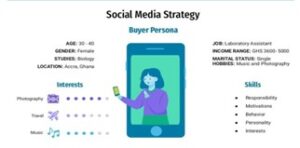…The bridge between business goals, the right social media platforms and the ideal customer
In a competitive business environment, knowing your target audience is crucial for crafting effective marketing strategies and achieving business goals. Tailoring your messages to meet the specific needs and preferences of your audience will significantly boost engagement and conversion rates, ensure efficient resource use, and foster long-term customer loyalty. Below are some additional benefits of knowing your target audience.
Customised marketing
This involves tailoring your promotional messages to resonate with your audience’s needs and interests. This approach can lead to higher engagement and conversion rates. Kasapreko Company Limited, known for its wide range of beverages, customises its marketing campaigns based on the preferences of different demographic groups, ensuring that each message appeals directly to the intended audience.
Efficient resource use
By focusing your marketing efforts on high-potential segments, you can maximize your return on investment (ROI). Yummie Yoghurt, for instance, targets health-conscious individuals through Instagram and Facebook ads, ensuring that their limited marketing budget is spent on reaching people most likely to purchase their products.
Building loyalty
Understanding your audience helps build stronger, long-term relationships with your customers. Zoobashop uses insights from customer interactions to personalize their communication and offers, fostering a sense of loyalty and trust among their clientele.
Buyer personas
A buyer persona is a detailed profile representing your ideal customer based on market research, data analysis, and insights about your existing customers. It helps businesses understand their target audience better by defining their demographics, behaviours, motivations, goals, and challenges. Creating buyer personas helps craft more targeted marketing strategies, product development, and customer service initiatives that resonate with specific segments of your audience, thereby improving overall customer engagement and satisfaction.

Key elements of a buyer persona include
-
Demographics: Age, gender, income, education, and location are essential factors. For example, a luxury fashion brand in Ghana might target women aged 25-40 with high disposable incomes living in urban areas like Accra.
-
Psychographics: This includes interests, values, lifestyle, and behaviours. A business like Ghana Jollof, which delivers traditional Ghanaian dishes, may focus on customers who value convenience and enjoy local cuisine.
-
Challenges and pain points: Identifying common problems your audience faces helps in creating solutions that resonate. For instance, a fintech company might target small business owners struggling with traditional banking challenges.
-
Goals: Understanding what your audience hopes to achieve can inform your marketing messages. A company offering educational services might target students aiming for higher academic performance.
-
Preferred social media platforms: Knowing where your audience spends their time online is crucial. Selina Beb, a fashion brand, will find their audience of fashion-forward individuals more active on Instagram than on LinkedIn.










